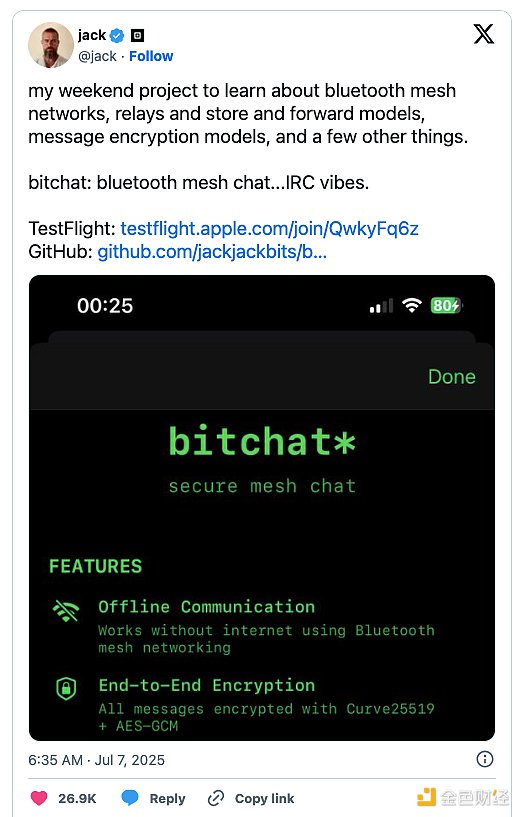Source: beincrypto; Translated by: AIMan@Jinse Finance
Key Points:
Bitchat supports Bitcoin and message encryption transmission via Bluetooth without requiring internet or mobile networks.
Messages are relayed through a Bluetooth mesh network without a central server, account, or permanent identifier.
Reliability depends on user density, with no delivery confirmation or routing logic in the current test version.
However, Bitchat lacks wallet or signature tools, and transactions are only transmitted when the relay device ultimately connects to the internet and broadcasts the transaction.
Twitter founder Jack Dorsey has released a test version of Bitchat, an app considered radical and potentially groundbreaking. It allows users to send/receive Bitcoin and chat completely offline with other users without network connectivity. This quick guide will explore this new app, including its underlying technology, whether it has powerful enough features to revolutionize cryptocurrency, potential vulnerabilities, and other key details.
The article is divided into 7 sections: 1. What is Bitchat? 2. How does Bitchat work? 3. What is the essence of Bitchat? 4. What are the drawbacks or vulnerabilities of Bitchat? 5. Does Bitchat have uses beyond encryption? 6. Is Bitchat just hype or substantial? 7. Frequently Asked Questions.
1. What is Bitchat?
Bitchat is an offline encrypted chat application that uses a Bluetooth mesh network to transmit messages without internet, servers, accounts, email, or phone numbers.
Bitchat builds a peer-to-peer Bluetooth Low Energy (BLE) mesh network between devices. Each smartphone running Bitchat serves as a client and relay node, transmitting encrypted information, extending its coverage beyond the typical 30-meter Bluetooth range.
Essentially, your message can jump from one phone to the next, repeatedly - up to seven automatic hops - to reach a distant recipient without any internet infrastructure. This offline-first design directly addresses one of the oldest criticisms of Bitcoin.
"'What if the power goes out' is a common concern among Bitcoin skeptics. Jack Dorsey's Bitchat solves this with an inexpensive, accessible mesh network," Bitcoin pioneer Max Keiser told BeInCrypto.
Jack Dorsey compares this system to old-school IRC chat rooms, but with modern encryption and no central server. No account creation is needed, nor mobile network coverage.

For example, in natural disasters, protests, or internet disruptions, you can use this app to share information with nearby devices without using mobile cell towers or Wi-Fi. This makes it a potential lifeline in emergency situations - whether you are coordinating rescue efforts, sending location information, or simply staying in touch.
With some planning, Bitchat's design could also benefit people in remote areas with weak infrastructure. For example, schools, field research teams, or rescue personnel can use it to exchange information without relying on expensive or unstable networks. Moreover, since it can run on everyday smartphones via Bluetooth, no special equipment is required.
Therefore, considering all these factors, Bitchat can evolve over time to serve as a secure local communication layer where traditional networks collapse.
6. Bitchat: Just Hype or Substantial Content?
At least in theory, its potential impact is enormous. Offline Bitcoin transfers can make cryptocurrencies more available during emergencies and large-scale power outages.
It could also prompt mainstream wallets and applications to consider offline functionality design. While early projects like goTenna and LochaMesh also explored similar ideas, Bitchat is one of the first mobile applications to achieve this goal on standard smartphones. And with Jack Dorsey's support, Bitchat might gain higher credibility and recognition (as we have already seen).
Therefore, although Bitchat may not bring about a complete transformation overnight, it could mark the early stages of a revolution where your ability to use cryptocurrencies will no longer depend on centralized infrastructure. More importantly, you will be in control even without the internet.
7. Frequently Asked Questions:
What is Bitchat and how does it work?
Bitchat is a peer-to-peer messaging application that operates completely offline using low-power Bluetooth (BLE). It creates a mesh network where each device acts as a relay, forwarding encrypted messages up to seven hops. No servers, accounts, or internet connection are required. The app uses strong encryption and temporary IDs to protect privacy and security.
Can Bitcoin be sent without internet using Bitchat?
Yes, Bitchat allows signed Bitcoin transactions to be transmitted via Bluetooth to nearby devices in its mesh network. Once the transaction reaches a phone with internet access, it will be broadcast to the Bitcoin network. This method does not require mobile signals or Wi-Fi, making it ideal for emergencies or areas with poor network connections. However, transmission cannot be guaranteed unless the relay ultimately connects to the internet. The app does not support native Bitcoin wallet functions at launch - it only transmits raw data.
Is Bitchat secure for sending messages and Bitcoin transactions?
Bitchat uses X25519 key exchange and AES-GCM end-to-end encryption to ensure message confidentiality and integrity. Message metadata (such as sender and receiver IDs) is also encrypted. The app supports virtual traffic to obscure real communication patterns. However, as of early July 2025, it still lacks delivery confirmation functionality and remains in the testing phase. Users should view it as a privacy-focused tool, not an infallible system for critical transmissions.
What are Bitchat's main limitations?
Bitchat's effectiveness depends on local user density, as it relies on short-range Bluetooth and device-to-device relays. In low-density areas, messages may not reach their destination. Additionally, it lacks routing optimization and delivery confirmation features, which could affect reliability. Due to limited Bluetooth bandwidth, the app is only suitable for text and small data payloads. Networked devices are still required to complete Bitcoin transactions on-chain.







